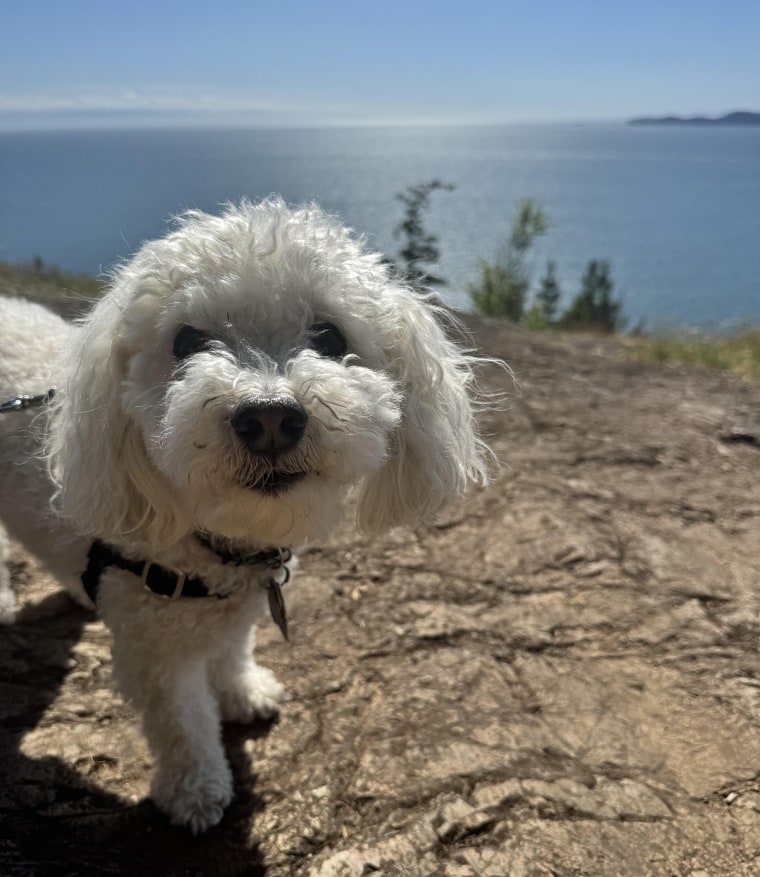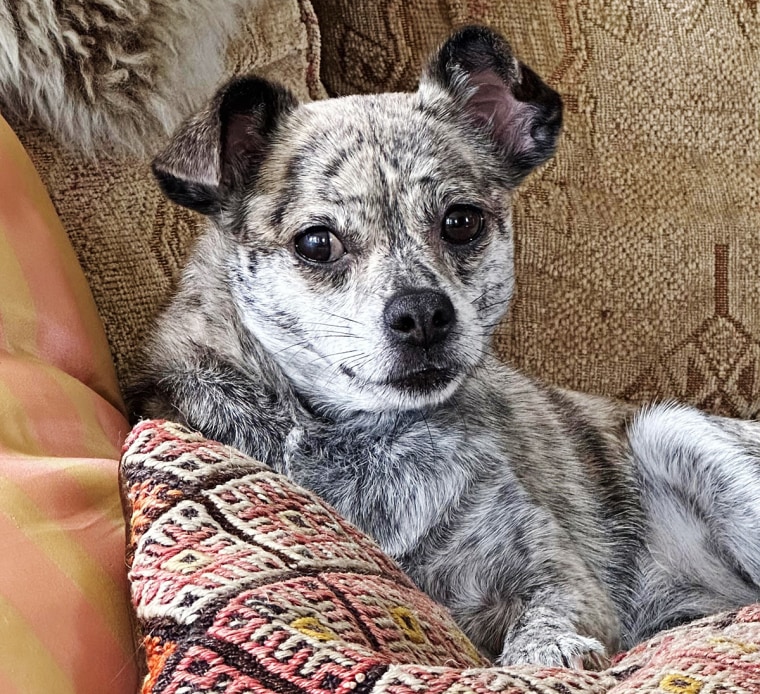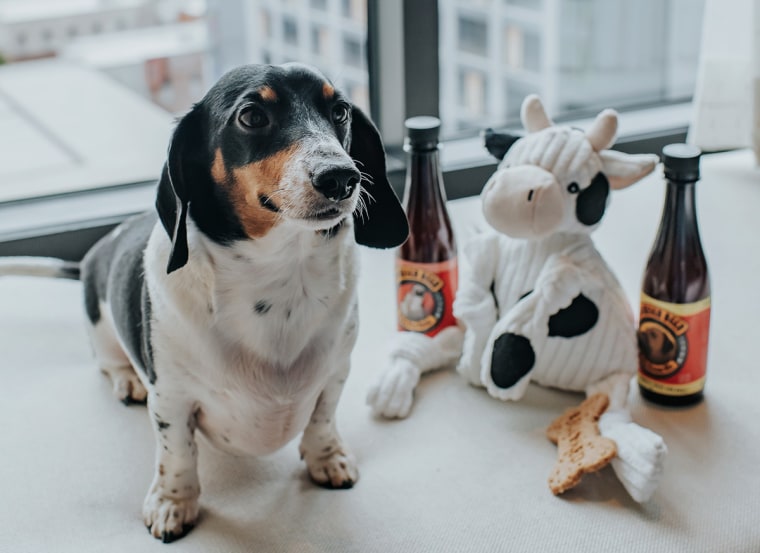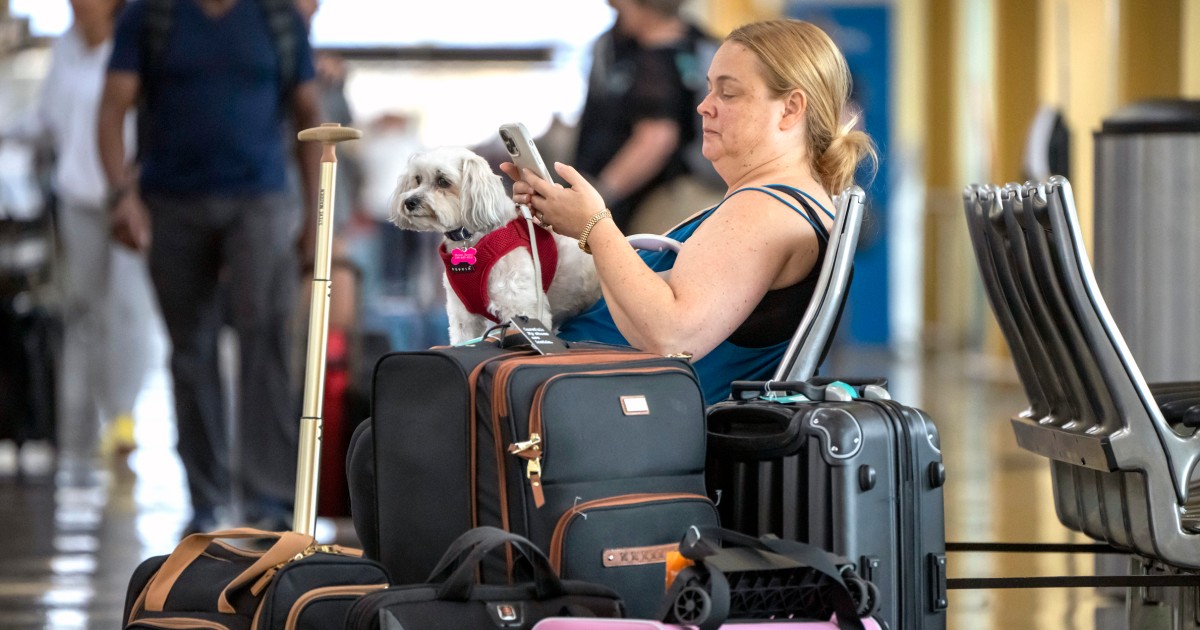Travelers have been crowding into airports in record numbers this year — including on four legs and leashes.
Tom Carpenter and his wife travel with their Havanese dog whenever they can. “His day care would be $350 for a 10-day trip, so paying hotel fees and $100 each way to take him on a plane is worth it,” the 67-year-old Anacortes, Washington, resident said. “Plus, Mori hates being left alone.”
The Carpenters are among the many pet owners who are getting more comfortable bringing their animals on their journeys, adding to the broader demand for pet-related services far afield of veterinarian offices.

“I saw an uptick in people traveling with their pets early in 2024,” said Heather Eisenstadt, founder of Top Dog Pet Travel, a central Florida agency specializing in pet-friendly bookings.
She recently helped a client bring her dog on a trip to Europe for a Taylor Swift concert by landing in Paris and taking Le Pet Express — a minibus for those traveling with pets — through the Channel Tunnel to the U.K. (A second Swiftie was interested but balked at the cost, Eisenstadt said.)
Twenty-two percent of both cat and dog owners reported taking their animals on at least three flights over the past year, up from 13% for dogs and 14% for cats in 2022, according to an August report from the American Pet Products Association (APPA), an industry group. Rates were up sharply for both types of animals tagging along on road trips too.
Young people are driving the trend. Thirty-eight percent of consumers ages 18-34 told Morgan Stanley researchers this year that they often travel with pets; 30% of those 35-54 and 13% of people 55 and older said the same.
Mori hates being left alone.
Tom Carpenter, Anacortes, Wash.
“There is no product segment that has, or had, the growth of the pet market,” said Simeon Gutman, a retail analyst at Morgan Stanley. “It’s a telling indication of the prioritization that people have for their pets.”
Pet ownership spiked during the pandemic and is returning to normal, with one or more pets now residing in 63% of U.S. households, the APPA estimates. And while many consumers have been getting more budget-conscious, they’re not holding back on spending on their animals.
Last year, Americans dropped more than $183 billion on pets, according to the Bureau of Economic Analysis, for everything from pet food and toys to vet visits and grooming. Even after stripping out the effects of inflation, pet spending rose by nearly a third from 2017 to 2023.
“We expect the industry to bark back by the end of 2025 and into 2026, after temporarily soft post-COVID demand,” the Morgan Stanley researchers said in their June report. The bank forecasts the pet industry to grow “faster than nearly all retail sub-segments” by the end of this decade, with spending on pet services set to more than double.
While analysts don’t track pet travel outlays specifically, some airlines and hotels appear eager to welcome more furry guests — aware that many visitors will pay a premium for it.
For one thing, arranging kennels or pet sitters can be a costly hassle for those leaving animals behind. “There’s also less stress,” said Patrick O’Brien, the APPA’s chief digital officer. “You’re not worrying if your pet is being taken care of the way you would.”
“I will always travel with my new pet, and I won’t spare any expense for accommodations,” said Annette Sacks, a 69-year-old retiree in Blairstown, New Jersey, who recently adopted a 5-year-old Chihuahua-mix rescue named Alonza.

U.S. airlines typically charge $95 to $150 per flight for small pets to fly in cabins, but some are hiking those rates. In February, American Airlines raised its carry-on pet fee from $125 to $150 each way; United Airlines followed suit in April.
Airlines don’t share how many pets fly each year in cabins, but the U.S. Department of Transportation said 188,223 animals flew as cargo in 2022, the latest year with complete data. That was less than half the number it was in 2019, though both United and Delta Air Lines have since discontinued the option, except for some military and foreign service personnel.
Some pet owners say they wouldn’t make use of it anyway. “I’d worry about the conditions in the cargo hold, the possibility of careless treatment and the fact that Mori would be out of my sight,” Carpenter said.
For dog owners who rule out cargo and can’t, or would rather not, squeeze their animals into under-seat carriers, Bark Air runs charter flights between New York’s Westchester County Airport and airports near Los Angeles, London and Paris. The service, offered by dog-centric company Bark, debuted in May with $6,000 domestic and $8,000 international one-way fares for each pet and their person.
When it comes to lodging, Airbnb said pet-friendly listings grew by 14% between June 2023 and June 2024, and 1 in 4 properties on its rental marketplace now welcome pets. About 30% of Vrbo properties are pet friendly, a spokesperson said, holding steady over the last couple years. Hosts on both platforms set their own pet fees.
I will always travel with my new pet, and I won’t spare any expense for accommodations.
Annette Sacks, Blairstown, NJ
Many hotels that accommodate pets charge nonrefundable fees, typically of up to $150 per stay. Most that do so provide food and water bowls, waste bags, treats, toys and bedding. Some brands, such as Motel 6 and Kimpton Hotels & Restaurants, have welcomed pets at no extra charge for decades.
Sonesta International Hotels hosts about 30,000 pets annually with flat fees starting at $75, a spokesperson said, adding that searches for pet-friendly bookings across its properties have surged 400% this year.
Nine of Hilton’s 24 brands are pet-friendly, including Hampton, Embassy Suites and Hilton Garden Inn. Pet fees vary by property but start at $50 and come with a perk that started rolling out in January 2022: Guests get online or phone access to pet behaviorists, nutritionists and vet techs at Mars Petcare who can offer advice about traveling with cats or dogs.
Some hotels hope to entice pet owners with splashier packages.
In May, the Bellyard Hotel in Atlanta introduced a “Very Important Pet (VIP)” package starting at $400 a night, not including the $150 pet fee. It includes a pet photo shoot, a welcome kit with organic treats, pet props and outfits, a round of drinks (cocktails for people, “dog beer” for dogs) and a day pass to a nearby dog park with ramps, tunnels and a sprinkler.

At Conrad Washington D.C., guests who check in with pets get dog beds, water bowls, branded scarves and pet bag dispensers. But the hotel is also offering a new “Lab of Luxury” package for a two-night stay in a “Bark View Suite.” It includes an Hermès pet collar and leash, a Tiffany & Co. water bowl, a pet photo session and an afternoon picnic with car service to several dog-friendly wineries in northern Virginia. The price is $5,999 and covers both a $500 donation to the Humane Society and the standard pet fee.
So far, there have been no takers for either hotel’s high-end offering.
Avery Price doesn’t want to break the bank to take her two German terriers, Brave and Bashful, on vacation. But the 41-year-old warehouse supervisor from Allentown, Pennsylvania, sees hotel pet fees of up to $200 as reasonable.
“I find it very difficult to leave them behind,” she said. “My girls are definitely my family.”

Leave a Reply